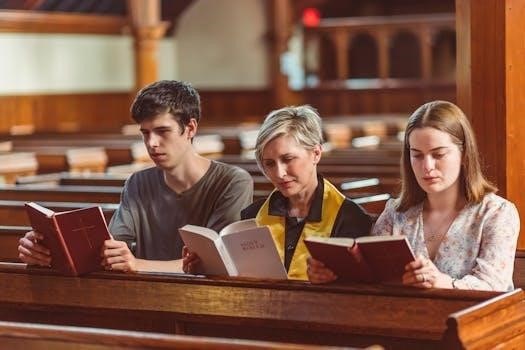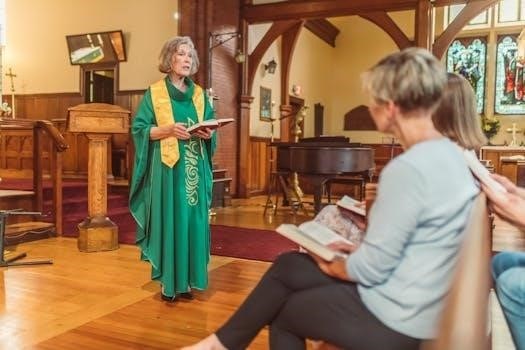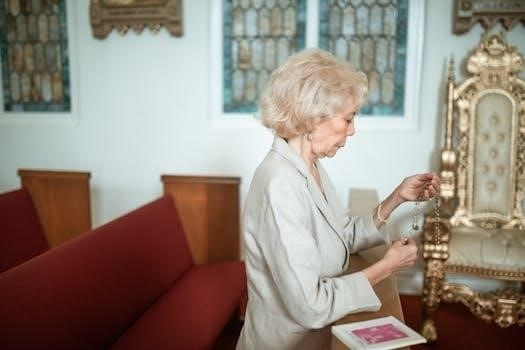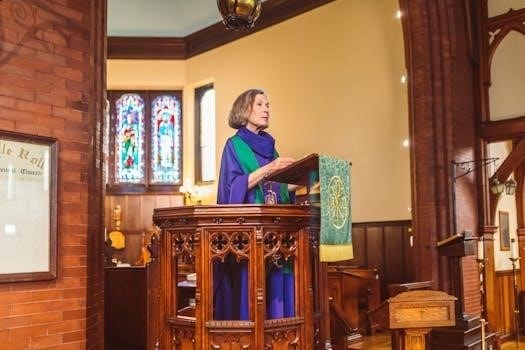
-
By:
- elizabeth
- No comment
duties of church elders pdf
Duties of Church Elders
Elders hold the primary responsibility for managing and caretaking the church, as highlighted in 1 Timothy 3⁚5. This encompasses various specific duties aimed at ensuring the church’s welfare.
Primary Responsibility⁚ Management and Caretaking
The elder’s foremost duty centers on serving as both a manager and a caretaker within the church community. This encompasses a wide array of responsibilities, including overseeing the church’s resources, ensuring its smooth operation, and nurturing the spiritual well-being of its members. Elders are entrusted with maintaining order, promoting unity, and addressing the diverse needs of the congregation. Their role is pivotal in fostering a healthy and thriving church environment. This foundational duty is essential for the overall flourishing of the church and its mission, requiring dedication, wisdom, and a servant’s heart to guide and protect the flock.

Specific Duties of Elders
Elders undertake specific duties like leading worship, preaching, teaching, pastoral care, administering sacraments, and ordering church life. These roles are essential for the church’s spiritual health and overall function.
Leading Worship
Elders play a vital role in leading worship, reflecting the heavenly scene where elders bow before God. Their leadership ensures reverent services, guiding congregations in honoring the Lamb. They contribute to creating a worshipful atmosphere that connects believers with the divine; Elders help to plan services that glorify God and encourage spiritual growth in the church. They also provide leadership during worship, fostering a sense of unity and reverence among the congregation. Their involvement ensures that worship is both meaningful and transformative, as they actively participate in creating an environment conducive to encountering God’s presence and experiencing His grace.
Preaching and Teaching
Elders are responsible for preaching and teaching the Word, serving as the preaching and teaching leaders of the church. They ensure sound doctrine is communicated effectively. They instruct the congregation in biblical truth and its practical application to everyday life. Through their teaching, elders equip believers to grow in their faith and understanding. They also clarify complex theological concepts, making them accessible to all. Moreover, elders play a crucial role in nurturing spiritual maturity within the church by faithfully delivering God’s message. Their leadership strengthens the congregation’s knowledge and devotion to Christ, promoting spiritual growth and transformation.
Pastoral Care and Counsel
Elders provide pastoral care and counsel, attending to the spiritual and emotional needs of the church members. This involves offering guidance, support, and encouragement during times of difficulty or uncertainty. They listen attentively, offering biblical wisdom and applying it to individual situations. Elders also provide comfort and compassion to those who are hurting, demonstrating Christ’s love and empathy. They offer practical advice and support, helping individuals navigate challenges. Moreover, elders play a vital role in fostering a caring and supportive community within the church. Their nurturing leadership promotes healing, restoration, and spiritual well-being among the congregation.
Administering Sacraments
Elders are authorized to preside over the sacraments of Baptism and Holy Communion, signifying their role in administering these sacred rituals. In Baptism, elders oversee the symbolic cleansing and initiation of new believers into the church community. They ensure that the sacrament is conducted reverently and in accordance with biblical teachings, welcoming new members into the body of Christ. Similarly, in Holy Communion, elders lead the congregation in remembering Christ’s sacrifice, distributing the bread and wine as symbols of His body and blood. They guide the participants in reflecting on the significance of the sacrament.
Ordering Church Life
Elders are entrusted with the responsibility of ordering the life of the church, ensuring its smooth functioning and adherence to biblical principles. This involves overseeing various aspects of church operations, including organizing services, coordinating events, and managing resources. Elders also play a crucial role in maintaining discipline within the church, addressing conflicts, and resolving disputes in a fair and just manner. They work together with the congregation to decide on how the local church functions, ensuring that decisions are made in accordance with God’s will and for the benefit of the entire community.

Elders as Shepherds
Elders are called to shepherd their church members, mirroring the care a shepherd provides for their flock. This involves leading, teaching, protecting, and loving the congregation, similar to shepherding sheep.
Leading and Teaching
Elders are the preaching and teaching leaders within the church, responsible for guiding the congregation in understanding and applying biblical truths. They lead by example, embodying the principles they teach and fostering spiritual growth among church members. As shepherds, elders provide instruction and direction. They should be peacemakers, prayer warriors, teachers, leaders by example, and decision makers; This involves delivering sermons, conducting Bible studies, and offering guidance on theological matters. Through their leadership and teaching, elders equip the church to live out its faith effectively and make a positive impact in the world. Elders lead under the authority of Christ.
Protecting Church Members
Elders have a crucial role in safeguarding church members from spiritual and moral dangers. They watch over and protect the assembly. This involves discerning false teachings, addressing conflicts, and providing counsel to those facing challenges. Elders must be vigilant in identifying and addressing potential threats to the church’s unity and well-being. As shepherds, they shield the flock from harm, offering support and guidance to those who are vulnerable. They protect church members the way shepherds care for the sheep in a flock. By providing a safe and nurturing environment, elders foster spiritual growth and resilience among church members.
Loving Church Members
Beyond leadership and protection, elders are called to demonstrate genuine love and care for each member of the church. This love extends beyond mere duty; it involves empathy, compassion, and a willingness to invest time and energy in the lives of others. Elders are encouraged to offer support, encouragement, and practical assistance to those in need. They are peacemakers and leaders by example. By fostering a culture of love and acceptance, elders create a warm and welcoming environment where church members feel valued, supported, and connected. This love reflects the love of Christ, drawing others closer to Him.

Responsibilities of Oversight
Elders bear responsibilities of oversight, encompassing shepherding, doctrinal purity, and prayer for their church family. Their vigilance ensures the church remains healthy, grounded in truth, and spiritually vibrant.
Doctrinal Purity
Elders are entrusted with upholding doctrinal purity within the church. They serve as guardians of the church’s theological foundations. This crucial responsibility entails ensuring that the teachings and beliefs align with sound doctrine and biblical truth. Elders are called to protect the congregation from false teachings and deviations from the core tenets of the faith. They must diligently study and understand scripture, discerning truth from error, and guiding the church toward a deeper understanding of God’s word. By safeguarding doctrinal purity, elders contribute to the spiritual health and stability of the church, fostering an environment of growth.
Prayer
Prayer is a vital responsibility entrusted to church elders, highlighting their dependence on God’s guidance and power. Elders should be devoted to regular and fervent prayer, both individually and corporately. They intercede for the needs of the church, seeking God’s wisdom, provision, and protection. Through prayer, elders cultivate a deeper relationship with God and discern His will for the church; They also model the importance of prayer to the congregation, encouraging them to engage in consistent prayer. By prioritizing prayer, elders create an atmosphere of spiritual vitality and dependence on God’s grace within the church, fostering unity and strength.

Elders and Church Governance
Elders collaborate with the congregation in decision-making, as seen in Acts 15⁚22, ensuring the church functions effectively. They also vigilantly watch over and protect the assembly from harmful influences.
Decision Making with Congregation
Elders play a vital role in decision-making processes within the church, collaborating with the congregation to determine the direction and function of the local church. This collaborative approach, as exemplified in Acts 15⁚22, ensures that the church’s decisions reflect the collective wisdom and desires of its members. By working together with the congregation, elders foster a sense of unity and shared ownership, promoting a healthy and harmonious church environment. This participatory decision-making process empowers church members to actively contribute to the life and ministry of the church, strengthening their commitment and involvement. The elders’ role is to guide and facilitate these discussions, ensuring that decisions are made in accordance with biblical principles and the best interests of the church community.
Protecting the Assembly
Elders are entrusted with the crucial responsibility of watching over and protecting the church assembly from various threats, both internal and external. This includes safeguarding the church from false teachings, divisive influences, and any other factors that could undermine its unity and spiritual health. Drawing from Acts, elders are vigilant in identifying and addressing potential dangers, ensuring the church remains a safe and nurturing environment for all members. Their protective role extends to addressing conflicts, providing counsel, and promoting reconciliation within the church community. By diligently guarding the assembly, elders contribute to the overall well-being and stability of the church, enabling it to thrive and fulfill its mission. They act as spiritual watchmen, alert to any signs of danger and committed to preserving the integrity of the church.